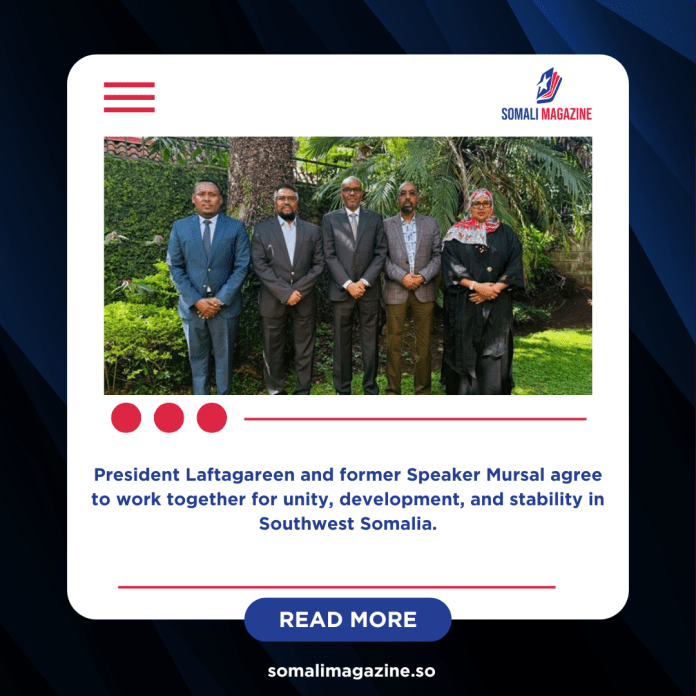Facebook Twitter (X) Instagram Somali Magazine - People's Magazine
Southwest regional state President Abdiasis Mohamed Laftagareen and former Speaker of Somalia’s House of the People, Mohamed Mursal Abdirahman, have ended a long-standing political disagreement after meeting in Nairobi on Monday. This reconciliation comes after years of tensions that had caused divisions within the Southwest administration, particularly affecting governance in Baidoa.
The meeting was facilitated by Member of Parliament Aden Mohamed Nur (Saransoor), former MP Samira Hassan Abdulle, and close aides of President Laftagareen. It marked the first time the two influential political figures met face-to-face in several years. During their discussions, both leaders agreed to put aside past differences and focus on unity, solidarity, and the development of the Southwest State and Somalia as a whole.
President Laftagareen shared the outcome on his official Facebook page, saying, “I met with my brother Speaker Mohamed Mursal in Nairobi today, and we agreed to resolve our differences and work together for the unity, solidarity, and progress of the Southwest State and the Somali nation.” His statement highlighted a commitment to moving forward collaboratively, signaling a new chapter in their political relationship.
The reconciliation is considered a major step toward restoring cooperation within the Southwest regional administration. Previously, the two had clashed over governance and political control in Baidoa, with Laftagareen’s administration reportedly restricting Mursal’s visits to the city on multiple occasions. These disagreements had not only affected their personal relationship but also created friction in regional politics, complicating coordination between local and federal authorities.
Analysts believe that the renewed cooperation could help ease political tensions in Baidoa and create a more stable environment for governance. By working together, Laftagareen and Mursal may strengthen collaboration between regional and federal political actors, which is crucial at a time when Somalia faces ongoing security and governance challenges.
Observers note that this reconciliation could serve as a model for resolving other political disputes in the country. The willingness of both leaders to meet, discuss their differences openly, and commit to cooperation demonstrates the potential for dialogue and compromise to address political conflicts. It also sends a positive signal to the public, showing that leaders can prioritize the nation’s interests over personal or political rivalry.
While details of the discussions were not fully disclosed, sources close to the leaders say that the meeting focused on creating a roadmap for joint efforts in regional development, improving administrative coordination, and supporting national stability. Both leaders have reportedly agreed to maintain open communication and consult each other on key political decisions affecting the Southwest State.
The reconciliation has already sparked optimism among local officials and residents, who hope that improved collaboration between the regional administration and federal representatives will result in more efficient governance and service delivery. In a country like Somalia, where political divisions can quickly escalate into larger conflicts, this development is being welcomed as a step toward greater unity and stability.
Ultimately, the resolution of this political dispute illustrates the importance of dialogue and personal engagement in Somali politics. By prioritizing national interests and working together, President Laftagareen and Speaker Mursal are setting a precedent for how leaders can bridge differences, strengthen institutions, and contribute to the broader goal of peace and progress in Somalia.

